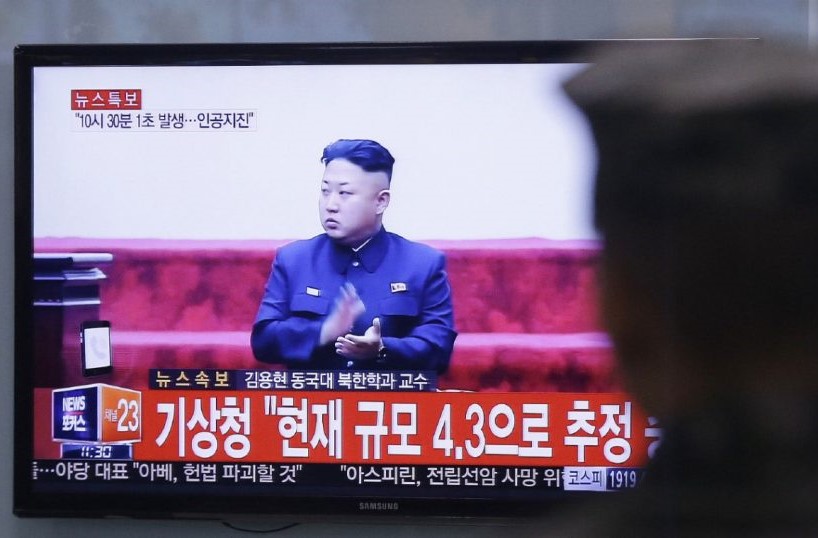AP photo
By
Tom Arms
I have a solution to Korea. It is…
No, I don’t think I will reveal it just yet. That would spoil the surprise, and besides, a bit of background might explain why this solution could work.
Let us first examine what each side wants. And by each side I mean the United States and China. North and South Korea are—like it or not—proxies.
The Chinese, quite simply want to be restored to what they regard as their natural predominant position in the East Asian political firmament.
Half a millennium ago the Chinese were quite justified in arrogantly calling themselves the Middle Kingdom. Everyone wanted what China produced. Economic historians reckon that the Chinese produced 45 percent of the world’s GDP—roughly the same as Britain at the height of its empire and America in 1955. By the beginning of the twentieth century the most populous country in the world was responsible for only 1.5 percent of the world’s GDP.
What happened? Europe. The Portuguese and the Dutch sailed around Africa. The Spanish crossed the Pacific and the British and the French built and sailed through the Suez Canal. First they defeated and occupied Asian countries whose markets the Chinese had dominated for centuries. Then, through war, political intrigue, opium, unfair trading practices and the establishment of treaty ports, they bled dry the Chinese heartland.
The revolution that brought Mao and his communists to power was not a civil war. It was a battle against centuries of imperialism. Chiang was merely the puppet of the West, who, by this time, was represented by the United States.
Korea, meanwhile, had suffered a long history as a political football kicked around by China and Mongolia on its northern border and Japan in the south. In the dying days of World War Two the Soviet Union jumped in as well. The result was the division of Korea along the 38th Parallel with the communist regime strongly supported by Moscow in the North and the pro-western regime in the South nominally supported by Washington.
Fast forward to 2017. South Korea is protected by 28,500 American troops and a missile defence system. Under the protective US umbrella it has evolved into a prosperous and stable country. In contrast, North Korea is a Cold War relic kept alive by food and fuel from a reluctant China and the imposition of a siege mentality by its juvenile dictator. It has backed itself into a nuclear corner from which—it would appear—the only escape is through war.
China has turned its back on the Cold War isolationism and is now a fully integrated member of the world community. It has no interest in keeping Kim Jong-un in power.
But what if he goes? South Korea would absorb the northern half of the peninsula in much the same way as West Germany absorbed East Germany. And when the Germans united the Americans stayed. In fact, they not only stayed; they moved further East into Poland, the Baltic States, Bulgaria and Romania.
The Chinese have every reason to fear that the same would happen in Asia. If the Korean Peninsula united, the United States and its missiles would simply move further north and sit on the Yalu—a strengthened link in the chain of American-inspired alliances and military bases that have encircled China since the 1950s.
China did not—does not—like, support, smile upon, encourage or in any way endorse the development of nuclear weapons by North Korea.
But neither does it approve of the existence of 28,500 US troops in South Korea. It is especially unappreciative of America’s Terminal High Altitude Area Defence System (THAAD) which can reach Chinese targets just as easily as the North Korean facilities they are designed to counter.
The Chinese have a 5,000 year-plus history. This provides it with a long memory, much longer than that of the 241-year-old United States. It has not forgotten that it was once number one. It has not forgotten that the West cheated it out of its natural position in the world order. It has not forgotten the Korean War and Douglas MacArthur.
Are China’s fears rational? Perhaps, perhaps not. Trump’s chief strategist Steve Bannon has in the past talked about the coming war with China. Trump did take a phone call from the Taiwanese president in his president-elect days and during and after his campaign he threatened Beijing with massive tariffs.
But, at the same time, this most unpredictable of presidents metaphorically and literally embraced Chinese President Xi Jinping at their Mar-a-Lago summit.
So, here is the proposal: Withdraw US troops from the Korean Peninsula which becomes a demilitarised buffer zone between China and the 53,000 American troops in Japan. In return, the Chinese join the rest of the world in applying stringent sanctions against Pyongyang.
The North Korean communist regime will collapse. The South Koreans will absorb the North. Its citizens will become a new market for Chinese goods instead of a drain on Beijing’s treasury.
From the American point of view, Donald Trump has consistently moaned about the cost of maintaining American forces overseas. The withdrawal of US forces from Korea would save $7 billion a year. This money that could be diverted to fighting ISIS, deporting Mexicans, building bridges and/or walls, or even reducing the spiralling national debt.
But most of all it would mean that a nuclear-armed relic from the Cold War era would be eliminated along with its paranoid obese dictator with a bad haircut.
Korea is currently a threat. It could be an opportunity.
Tom Arms is the editor of LookAheadnews.com. Sign up now for the weekly diary of world news events.



No Comments Yet!
You can be first to comment this post!